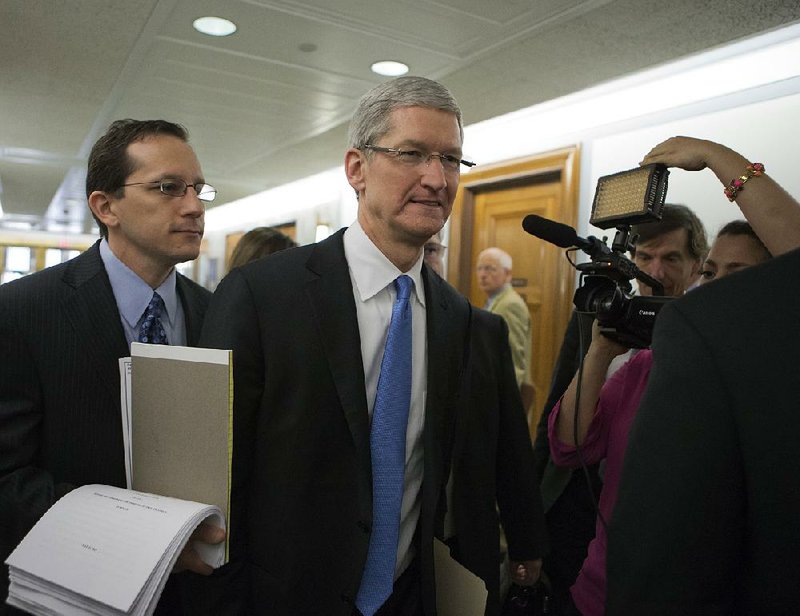A global effort to tighten corporate tax rules is gaining momentum as politicians in Europe and the United States take aim at American tech giants whose savvy use of international tax laws has provoked a public backlash.
A day after a U.S. Senate report slammed Apple’s use of Irish regulations to minimize payments to the U.S. government, European heads of state last week said they hoped for quick action from an international effort to change rules that let companies shelter profits.
Pushed by British Prime Minister David Cameron, who has faced public anger over the low taxes paid in his country by companies such as Amazon.com and Starbucks, the effort is moving quickly in European nations caught in an era of slow growth and painful austerity. Officials said they are driven not just by a hunt for revenue but also by the political difficulty of justifying to smaller businesses or homeowners why the world’s most sophisticated companies are allowed to play by a seemingly different set of rules.
“We are in an unprecedented economic crisis,” European Council President Herman Van Rompuy said Wednesday after European leaders endorsed plans to move ahead with information sharing and other steps to try to make companies pay more corporate tax. “We have to act because it is fair…. The economic crisis makes the difference.”
The rise of the issue to the top of the agenda among world leaders reflects a shift in how the firms that have come to drive the U.S. economy are perceived abroad. From their roots as edgy startups that challenged corporate orthodoxy, companies such as Apple and Google have become the very establishment they once threatened.
At one of Google’s regular Big Tent events in Britain, Labor Party leader Ed Miliband showed up with verbal guns blazing - saying that the company’s use of tax laws to minimize its contribution to society mocks its promises of corporate benevolence.
“I can’t be the only person here who feels disappointed that such a great company as Google, with such great founding principles, will be reduced to arguing that when it employs thousands of people in Britain, makes billions of pounds of revenue in Britain, it is fair that it should pay just a fraction of 1 percent of that in tax,” Miliband said, criticizing by name Google’s executive chairman, who was not in attendance. “It’s a shame Eric Schmidt isn’t here to hear me say this direct. When Google goes to extraordinary lengths to avoid paying its taxes, I say it’s wrong.”
The issue of corporate taxation has surged to the fore during Europe’s economic crisis, with countries including Ireland and the Netherlands singled out for offering easy shelters for multinationalslooking to avoid paying taxes in countries where they make the majority of their profits.
There are no global estimates of how much revenue governments lose through tax avoidance or evasion schemes.
But recent research by the Organization for Economic Cooperation and Development indicates the total is high.
Foreign direct investment, for example, in theory represents a long-term commitment by a firm in one country to owning productive capacity - a plant or building, for example - in another. But data show billions of dollars in foreign direct investment moving through small nations such as Bermuda and the Bahamas, suggesting that the money is not invested there but simply is used to set up a corporate presence, for tax purposes, before moving to a final destination elsewhere. The Netherlands is one of the top locations for U.S. foreign direct investment, butdata compiled by the Organization for Economic Cooperation and Development suggests the money ultimately moves on.
Such macro-level connections are only suggestive and prove nothing about the behavior of individual firms. But they have been enough for the Organization for Economic Cooperation and Development to press major nations to develop a global strategy for curbing tactics such as “hybrid mismatching” - in which the tax laws of several countries are played against each other to lower a corporation’s tax bill.
It is legal under current international tax laws and treaties but “far from the spirit of what the law is,” said an official with the Organization for Economic Cooperation and Development who was not authorized to speak on the record. Tax treaties were written “to avoid double taxation, not to allow double non-taxation.”
Cameron has pledged to put the issue of corporate tax avoidance at the top of the agenda when the Group of Eight industrialized powers meets in Northern Ireland next month. Russia is pressing the issue as well in its role as the current head of the broader Group of 20, which includes top developing nations such as China and Brazil.
It is a campaign driven by a series of revelations that have set the political blood boiling. Citizens and politicians in Britain waged a boycott against Starbucks last year, for instance, after learning that the company had used a maze of deals with European subsidiaries to pay just $13.76 million in British corporate taxes on nearly $5 billion in British sales since 1998.
Some of the company’s revenue was transferred to a subsidiary in the Netherlands, a country the Organization for Economic Cooperation and Development said is often used by non-European firms as headquarters for their European operations because of the favorable tax rules.
Information for the report was contributed by Anthony Faiola of The Washington Post.
Business, Pages 67 on 05/26/2013

